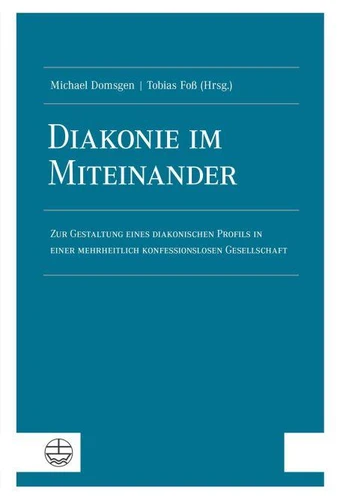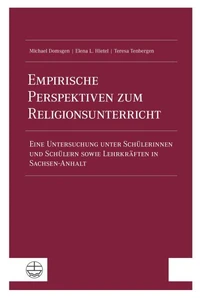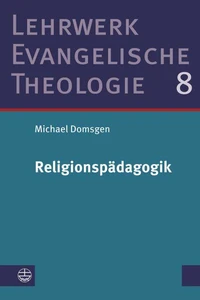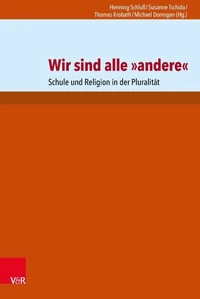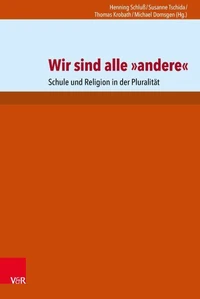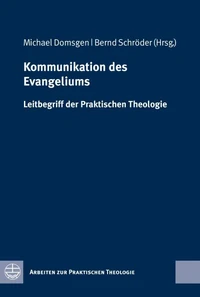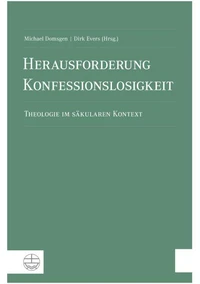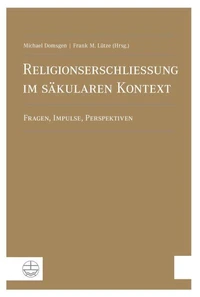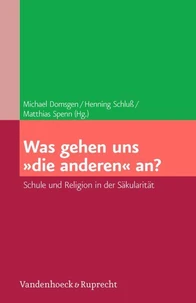Diakonie im Miteinander. Zur Gestaltung eines diakonischen Profils in einer mehrheitlich konfessionslosen Gesellschaft
Par : ,Formats :
Disponible dans votre compte client Decitre ou Furet du Nord dès validation de votre commande. Le format PDF est :
- Compatible avec une lecture sur My Vivlio (smartphone, tablette, ordinateur)
- Compatible avec une lecture sur liseuses Vivlio
- Pour les liseuses autres que Vivlio, vous devez utiliser le logiciel Adobe Digital Edition. Non compatible avec la lecture sur les liseuses Kindle, Remarkable et Sony
 , qui est-ce ?
, qui est-ce ?Notre partenaire de plateforme de lecture numérique où vous retrouverez l'ensemble de vos ebooks gratuitement
Pour en savoir plus sur nos ebooks, consultez notre aide en ligne ici
- Nombre de pages212
- FormatPDF
- ISBN978-3-374-06976-7
- EAN9783374069767
- Date de parution01/07/2021
- Protection num.Digital Watermarking
- Taille2 Mo
- Infos supplémentairespdf
- ÉditeurEvangelische Verlagsanstalt
Résumé
Auf dem Markt unterschiedlicher Anbieter ringt auch die Diakonie mehr denn je um ihre Erkennbarkeit, christlich verankert zu sein. Wie kann sie sich als christliche Anbieterin profilieren, wenn mehr als die Hälfte der Mitarbeitenden konfessionslos ist? Wie lässt sich ein diakonisches Profil innerhalb der eigenen Mitarbeitschaft etablieren, wenn Sozialisations- und Tradierungsabbrüche von Kirche und Christentum so deutlich hervortreten? Der vorliegende Aufsatzband versucht, sich aus diakoniewissenschaftlicher, systematisch-theologischer und empirischer Sichtweise diesen Fragen anzunähern.
Unterschiedliche Akteure aus Wissenschaft, Diakonie und Kirche kommen zu Wort und setzen Impulse, wie Diakonie in einer mehrheitlich konfessionslosen Gesellschaft gestaltet und verändert werden sollte. Mit Beiträgen von Michael Bartels und Johannes Eurich, Sabine Blaszcyk, Cornelia Coenen-Marx, Michael Domsgen, Michaela Gloger und Harald Wagner, Tobias Foß, Christian Frühwald, Ulf Liedke, Ulrich H.
J. Körtner, Friedrich Kramer, Thorsten Moos, Ulrike Petermann, Klaus Scholtissek und Christoph Stolte. [Diakonie in togetherness] At the market of different providers the social welfare work "Diakonie" struggles more than ever for his recognizability to be rooted in Christian Traditions. How could it distinguish itself as Christian provider, if more than the half of its own employees are confessionsless? How could a diaconal profile be created within its own employees, if demolition of socialisation and tradition of church and Christianity clearly becomes evident? This volume of essays trys to approach these questions from a diaconical, systematic-theological and empirical view.
Different actors from science, social welfare work and church get a chance to speak and to set impulses, how "Diakonie" could be created and changed in a majoritarian confessionless society.
Unterschiedliche Akteure aus Wissenschaft, Diakonie und Kirche kommen zu Wort und setzen Impulse, wie Diakonie in einer mehrheitlich konfessionslosen Gesellschaft gestaltet und verändert werden sollte. Mit Beiträgen von Michael Bartels und Johannes Eurich, Sabine Blaszcyk, Cornelia Coenen-Marx, Michael Domsgen, Michaela Gloger und Harald Wagner, Tobias Foß, Christian Frühwald, Ulf Liedke, Ulrich H.
J. Körtner, Friedrich Kramer, Thorsten Moos, Ulrike Petermann, Klaus Scholtissek und Christoph Stolte. [Diakonie in togetherness] At the market of different providers the social welfare work "Diakonie" struggles more than ever for his recognizability to be rooted in Christian Traditions. How could it distinguish itself as Christian provider, if more than the half of its own employees are confessionsless? How could a diaconal profile be created within its own employees, if demolition of socialisation and tradition of church and Christianity clearly becomes evident? This volume of essays trys to approach these questions from a diaconical, systematic-theological and empirical view.
Different actors from science, social welfare work and church get a chance to speak and to set impulses, how "Diakonie" could be created and changed in a majoritarian confessionless society.
Auf dem Markt unterschiedlicher Anbieter ringt auch die Diakonie mehr denn je um ihre Erkennbarkeit, christlich verankert zu sein. Wie kann sie sich als christliche Anbieterin profilieren, wenn mehr als die Hälfte der Mitarbeitenden konfessionslos ist? Wie lässt sich ein diakonisches Profil innerhalb der eigenen Mitarbeitschaft etablieren, wenn Sozialisations- und Tradierungsabbrüche von Kirche und Christentum so deutlich hervortreten? Der vorliegende Aufsatzband versucht, sich aus diakoniewissenschaftlicher, systematisch-theologischer und empirischer Sichtweise diesen Fragen anzunähern.
Unterschiedliche Akteure aus Wissenschaft, Diakonie und Kirche kommen zu Wort und setzen Impulse, wie Diakonie in einer mehrheitlich konfessionslosen Gesellschaft gestaltet und verändert werden sollte. Mit Beiträgen von Michael Bartels und Johannes Eurich, Sabine Blaszcyk, Cornelia Coenen-Marx, Michael Domsgen, Michaela Gloger und Harald Wagner, Tobias Foß, Christian Frühwald, Ulf Liedke, Ulrich H.
J. Körtner, Friedrich Kramer, Thorsten Moos, Ulrike Petermann, Klaus Scholtissek und Christoph Stolte. [Diakonie in togetherness] At the market of different providers the social welfare work "Diakonie" struggles more than ever for his recognizability to be rooted in Christian Traditions. How could it distinguish itself as Christian provider, if more than the half of its own employees are confessionsless? How could a diaconal profile be created within its own employees, if demolition of socialisation and tradition of church and Christianity clearly becomes evident? This volume of essays trys to approach these questions from a diaconical, systematic-theological and empirical view.
Different actors from science, social welfare work and church get a chance to speak and to set impulses, how "Diakonie" could be created and changed in a majoritarian confessionless society.
Unterschiedliche Akteure aus Wissenschaft, Diakonie und Kirche kommen zu Wort und setzen Impulse, wie Diakonie in einer mehrheitlich konfessionslosen Gesellschaft gestaltet und verändert werden sollte. Mit Beiträgen von Michael Bartels und Johannes Eurich, Sabine Blaszcyk, Cornelia Coenen-Marx, Michael Domsgen, Michaela Gloger und Harald Wagner, Tobias Foß, Christian Frühwald, Ulf Liedke, Ulrich H.
J. Körtner, Friedrich Kramer, Thorsten Moos, Ulrike Petermann, Klaus Scholtissek und Christoph Stolte. [Diakonie in togetherness] At the market of different providers the social welfare work "Diakonie" struggles more than ever for his recognizability to be rooted in Christian Traditions. How could it distinguish itself as Christian provider, if more than the half of its own employees are confessionsless? How could a diaconal profile be created within its own employees, if demolition of socialisation and tradition of church and Christianity clearly becomes evident? This volume of essays trys to approach these questions from a diaconical, systematic-theological and empirical view.
Different actors from science, social welfare work and church get a chance to speak and to set impulses, how "Diakonie" could be created and changed in a majoritarian confessionless society.

